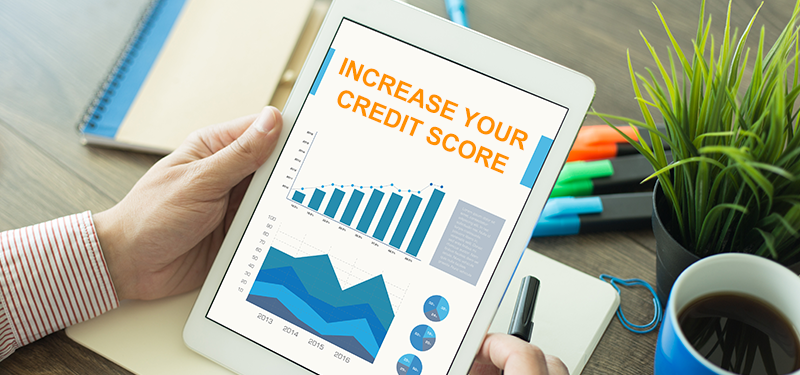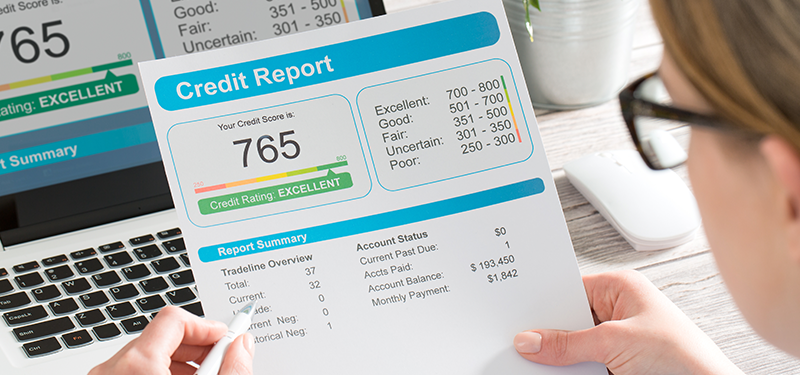How are credit scores calculated

Why is your credit score important?
Your credit score is ultimately the main factor when you are being considered for credit or lending of any kind. In fact, lenders have become so dependent on credit scoring that they now make separate offers available to each credit score “bracket”. In other words, lenders will make unique terms and rates for consumers who fall into a credit score range. For example; if you have a 580-620 score, you qualify for “x” interest rate and “x” terms. If you have a 620-680 score, you qualify for “x” interest rate and “x” terms, and so on.
These terms and rates ultimately determine how much cash you have to pay every month for the item you want to finance. (e.g. car, house, credit card, boat, etc.) This means that two different people who purchase the same item for the same amount can still pay different payments every month.
This is why a good credit score is so important. Not only does it determine whether you can get the item at all (qualify), but it also determines whether you can afford the payments even if you do qualify!
What is considered a “good” credit score?
When someone hires The Credit People to start working on their credit, one of the first things we share with them is their starting credit scores. And once they see their scores, the first question we’re usually asked is if it is a “good” score or not.
It’s not always a straight-forward answer. It’s subjective to their goals and the purpose the lenders are evaluating their credit for. In other words, if you’re trying to get approved for a book club card, a 610 credit score might be “good enough”. However, if you’re trying to get the best rate on a home loan, then 610 would not be a “good” score.
Many lenders use 720 as the minimum point for giving borrowers the best rates. Others consider 620 as a minimum. Any borrower with a lower score is considered “subprime” and a higher risk to the lender.
How Your Credit Score Affects You
If your credit score is high enough, you'll qualify for a lender's best rates and terms. Your mailbox will be stuffed with low-rate offers from credit card issuers, and mortgage lenders will fight for your business. You'll get great deals on auto financing if you need a car, a home loan if you want to buy a house, or even small business loans if you decide to start your own business.
If your credit score is low, however, you'll constantly fight an uphill battle where mainstream credit is nearly impossible to come by. And if you do find someone to lend you money, you'll pay high rates and fat fees for it. A bad, or even mediocre credit score can easily cost you tens of thousands, or even hundreds of thousands of dollars in your lifetime.
You don't even have to have a ton of bad credit to pay the price. Sometimes all it takes is a single missed payment to knock more than 100 points off your credit score and put you in a lender's “high-risk” category. We have had customers of The Credit People see a single removal during our service that gives them a 120 point increase in their score. I’m sure you can imagine, missing 120 points off your credit score would drastically change the terms of any loan.
If we were just talking about loans, that would be scary enough. But landlords and insurance companies also use credit scores to evaluate applicants. A good score can win you cheaper premiums and better apartments, while a bad score can make insurance more expensive and make it impossible to even find a place to live in.
Yet even with these vital stakes on the line, too many people know far too little about credit scores and how they work.
Important facts YOU should know about credit scoring
Use it or Lose it: If you haven’t had any credit activity or updates to your credit report within a six month period then there might be a challenge obtaining your credit scores. If you’re lacking credit, or don’t have at least one account that has been open for six months and another that has had some sort of activity within the past six months, then your credit file can be considered a “thin” file.
Credit scoring systems are not open knowledge: The way FICO and other credit scoring systems calculate your score is a closely guarded secret. This means that companies like ours, and consumers like you, have to try our best to learn as much as we can about what makes the credit scores “tick” in order to have the best chance at effectively improving it.
For major purchases, a credit score isn’t the only thing lenders consider:
Although we mentioned how your credit score is the main factor in determining whether you qualify or not, it’s not the only factor. If you are applying for a home loan, for instance, you’ll find (especially in today’s times) lenders weighing a lot of other information like; your income, your debt, employment, and the loan amount your asking for compared to what you’ve proved to handle in the past, among many other things.
How Your Score Is Calculated
When most of us think of scores, we think of the relatively straightforward systems used in grade school tests. You get points (and possibly red check marks) for certain actions, behaviors, or answers, and those are totaled to determine your end credit score.
Credit scoring isn't that simple. Credit scoring models use "multivariate" formulas. This basically means that the value of any given bit of information in your report might depend on other bits of information. It is very complicated.
We have customers of The Credit People ask all the time; “How many points do you think this is costing me?” or “How many points do you think you can raise my score?”, etc. I’m sure you can see now how difficult it is to answer these questions, and although we try to give an educated guess, in the end no one can truly predict the exact outcome.
There's one thing that's always true though: The FICO credit scoring model (the most common credit scoring model) is set up to place more value on current behavior than on past behavior. That means that the effects of your old credit troubles lessen over time if you start handling credit more responsibly. This is the first area of concern you should look for on your credit report; recent negative items.
Recent negatives affect you tremendously. The scores are also designed to react strongly to any signs that a once-good risk might be turning bad. That's why someone with a good score might suffer more heavily from a late payment. This is actually why we always begin a new customer’s service by acting on the most recent negative items first.
It's generally a lot easier to lose points on your score than it is to gain them back, which is why it's so important to not only know how to improve your credit, but also to eventually learn how to protect your score as well.
The Five Most Important Factors
Let’s move on to some specifics. The following are the five main factors that affect your credit score according to their relative level of importance, along with a percentage figure that shows how heavily that factor is weighed in calculating your final credit score. However, keep in mind that each factor might weigh more or less heavily in your individual score, depending on your credit situation.
Your Payment History
This makes up about 35% of the overall score. It makes obvious sense: Your history of paying bills says a lot about how responsible you are with credit. Lenders want to know whether you pay on time and how long it's been since you've been late, if ever.
To give you some perspective: More than half of the country doesn’t have a single late payment on their credit reports (according to Fair Isaac Company) and only 3 in 10 have ever been 60 days or more overdue in the past 7 years.
When it comes to negative marks like late payments, the score focuses on three factors:
How recent: This is how recently the consumer got into trouble. The more time that's passed since the credit problem, the less it affects a score.
Frequency: As you might expect, someone who has had just one or two late payments typically looks better to lenders than someone who has had a dozen.
Severity: There's a definite "level of bad" when it comes to your credit score. A payment that's 30 days late isn't considered as serious as one that's 60 or 120 days late. Collections, tax liens, and bankruptcy are among the biggest black marks. Our client portal at thecreditpeople.com actually indicates which items are affecting your credit score the most. While we’re working on our client’s credit reports, they can see how impactful the improvement on their credit report really is by being able to see the severity of each item on their credit report.
If you've never been late, your clean history will help your score. But that doesn't mean you'll get a "perfect" score. A good credit history involves a lot more...
How Much You Owe
This equates to 30% of your score. The score looks at the total amount owed on all of your accounts, as well as how much you owe on different types of accounts (credit card, auto loan, mortgages, and so on) which is also referred to as your “credit mix”.
To give you some perspective: Most Americans use less than 30 percent of their available credit limits, according to Fair Isaac. Only 1 in 7 uses 80 percent or more of available limits.
As you might expect, using a much higher percentage of your limits will worry lenders and potentially hurt your score. People who max out their credit limits, or even come close, tend to have a much higher rate of default than people who keep their credit use under control.
When it comes to revolving debt (credit cards and lines of credit); the credit score formula looks at the difference between your credit limits on the accounts and your balance, against the amount of credit you're actually using. The bigger the gap between your balance and your limit, the better!
So you need to be careful with how much you charge, even if you don’t carry a balance from month to month. Your total balance during the month should never approach your credit limit if you want a good score.
The score also looks at how much you owe on installment loans (mortgages, auto loans) compared to what you originally borrowed. Paying down the balances over time tends to help your score.
The reporting cycle: Creditors report your balances to the credit bureaus on a given day (usually each month, but sometimes only every other month or quarterly). It doesn't matter whether you pay the balance off in full the next day, the balance you owed on the reporting day is what shows up on your credit report. That's why people who pay off their credit cards in full every month still might have balances showing on their reports.
How Long You've Had Credit
This is 15% of your total score. Because of this, it's generally much less important than the previous two factors, but it still matters. You can have a good score with a short history, but typically the longer you've had credit, the better.
Again, to give you perspective: The average American's oldest account has been established for about 14 years, according to Fair Isaac. One in four has an account that's been established for 20 years or more.
The score considers both of the following:
-
1) The age of your oldest account
-
2) The average age of all your accounts
Your Last Application for Credit
This is 10% of your overall score. Opening new accounts can ding your credit score, particularly if you apply for lots of credit in a short time and you don't have a long credit history.
More perspective: The average American has not opened an account in 20 months. The score factors in the following:
How many accounts you've applied for recently?
How many new accounts you've opened?
How much time has passed since you applied for credit? How much time has passed since you opened an account?
Important Tip: You might have heard that "shopping around" for credit can hurt your score. But the formula takes into account that people tend to shop around for important loans such as mortgages and auto financing. As long as you do your shopping in a fairly concentrated period of time, it shouldn't affect the score used for your application.
Also, pulling your own credit report and score doesn't affect your score. So long as you do it yourself, ordering from a credit bureau or a reputable source, the inquiry won't count against you.
Do offers I receive in the mail affect my credit score?
There are basically two types of inquiries. When you apply for credit, you authorize the lender to view your credit history. This is known as a "hard inquiry" and can affect your credit score. You might also see inquiries that you didn't initiate such as offers you receive for new credit in the mail. These "soft inquiries" are typically made when a lender orders your credit report to make you a preapproved credit offer. Such marketing efforts don't affect your score.
The Types of Credit You Use
This is 10% of your score. The scoring formula wants to see a "healthy mix" of credit, but Fair Isaac is vague about what that means.
The company does say that you don't need to have a loan of each possible type; credit card, mortgage, auto loan, and so on, to have a “good” score. Furthermore, you're cautioned against applying for credit you don't need in an effort to boost your score, because that can backfire.
To get the “highest” possible scores, however, you need to have both revolving debts (like credit cards) and installment debts like an auto loan, mortgage, or personal loan. These latter loans don't have to still be open to influence your score. But they do still need to show up on your credit report. We like to take a look at our customer’s credit reports and make some recommendations on improving their credit mix based on our experience. Here are some basics...
Major credit cards such as Visa, MasterCard, American Express, and Discover are typically better for your credit score than department store or other "finance company" cards. (Department stores' cards are typically issued by finance companies, which specialize in consumer lending and which, unlike banks, don't receive deposits.)
Installment loans can reflect well on your score, too. That's because lenders generally require more documentation and take a closer look at your credit before granting the loan. This gives it a stronger weight on your credit score.
To give you some perspective again: The average American has 13 overall credit accounts showing on their credit report(s), including 9 credit cards and 4 installment loans, according to Fair Isaac company.
Summary
Knowing your credit score is very important; this is exactly why we obtain our customer’s credit scores for them right away when they get started.
Now that you have a better understanding of how your credit score is calculated, and why it is so important, find out what yours is! You can obtain your credit scores online, and there are also countless resources, books, and of course TheCreditPeople.com website to help you along the way.





